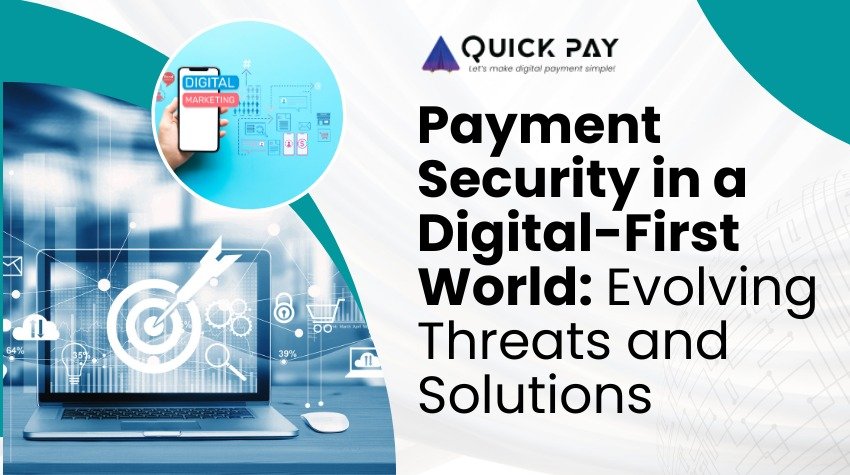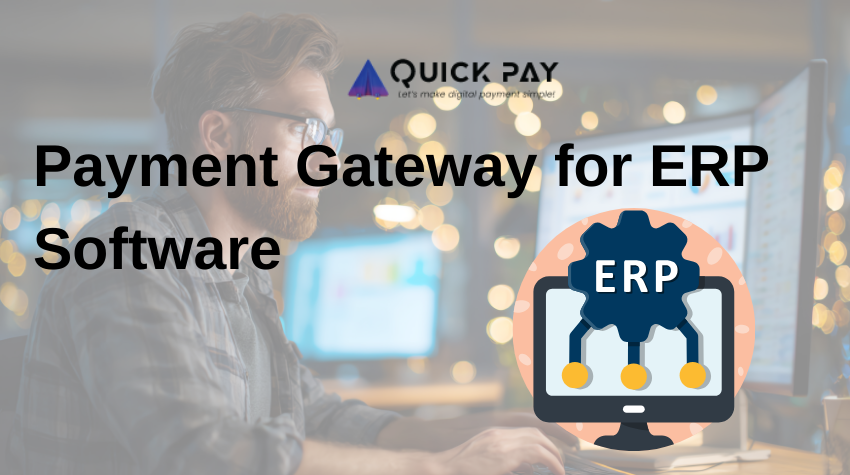In today's digital-first era, where online transactions are not just common but a necessity, payment security has become one of the most critical concerns for both businesses and consumers. As a trusted payment solution provider, Quick Pay is at the forefront of addressing these challenges, ensuring every transaction is safe, swift, and seamless.
This article explores the evolving landscape of digital threats, the role of a payment gateway, and how businesses can stay ahead with proactive solutions.
The Digital Shift: Convenience vs. Risk
With the rise of e-commerce, mobile banking, digital wallets, and UPI, India and the global market are witnessing a monumental shift in how payments are made. Customers demand fast, easy, and secure transactions. But with great convenience comes greater risk.
Cybercriminals are getting smarter. Phishing, identity theft, malware attacks, and data breaches are becoming more sophisticated by the day. For businesses, a single security lapse can mean not just financial loss but a damaged reputation and loss of customer trust.
This is where the role of a payment gateway becomes indispensable.
What is a Payment Gateway?
A payment gateway is a technology that captures and transfers payment data from the customer to the acquiring bank. It acts as the middleman between your customer's bank and your business, ensuring that sensitive data like card numbers and passwords are encrypted and securely transmitted.
But it's not just a tool-it's the guardian of your customer's payment information.
Some of the core functions of a secure payment gateway include:
- Data Encryption: Ensuring sensitive data is unreadable to unauthorized users.
- Fraud Detection: Real-time monitoring to identify suspicious transactions.
- Tokenization: Replacing sensitive data with unique identification symbols.
- PCI DSS Compliance: Following international security standards for payment processing.
At Quick Pay, our payment gateway is built with multi-layered security and modern encryption technology, designed to detect and prevent threats before they cause harm.
The Rising Threat Landscape in 2025
Let's look at some of the biggest threats businesses face today in the world of digital payments:
- Phishing and Social Engineering
Attackers use fake emails or websites to trick users into giving away login details or payment credentials. Even the most tech-savvy individuals can fall prey if they're not cautious.
- Man-in-the-Middle Attacks
This happens when a hacker secretly intercepts communication between a user and a website. In the context of online payments, this can lead to stolen card details or credentials.
- Fake Payment Gateways
Cybercriminals have started creating clone websites with fake payment gateways. These look almost identical to the real ones and trap users into entering their details.
- Carding and Identity Theft
Carding involves using stolen credit card information to make unauthorized purchases. Hackers use bots to test stolen cards on different websites through unprotected payment gateway forms.
- Data Breaches
Hackers target companies with weak database security to steal large volumes of sensitive user data. This information is later sold on the dark web or used for financial fraud.
How Quick Pay Combats Digital Threats
At Quick Pay, payment security isn't just a feature-it's a philosophy. We believe that businesses shouldn't have to choose between convenience and security. That's why we've integrated industry-leading technologies and best practices into our payment gateway platform.
Here's how we keep your business and customers protected:
1. AI-Powered Fraud Detection
Our system uses artificial intelligence to study transaction patterns. It can identify and flag suspicious behavior instantly-whether it's an unusually large transaction, a foreign IP address, or rapid-fire card attempts.
2. Two-Factor Authentication (2FA)
We support 2FA to add an extra layer of security. Even if someone steals a password, they won't get far without the secondary verification step.
3. Real-Time Transaction Monitoring
With our live monitoring dashboard, you can view all payment activities and detect inconsistencies before they become threats.
4. PCI DSS Level 1 Certified
Our payment gateway complies with the highest level of Payment Card Industry Data Security Standards, ensuring data is stored, processed, and transmitted with the highest levels of protection.
5. Secure APIs
All our APIs are SSL certified and undergo regular penetration testing to make sure there are no weak links in the chain.
Building Trust Through Transparency
One of the biggest assets in a business-customer relationship is trust. A secure payment experience is essential to gain and maintain that trust. At Quick Pay, we believe in transparency, offering complete visibility into transaction histories, security logs, and customer behavior insights.
Educating merchants and customers alike on best practices-like avoiding public Wi-Fi during transactions or never sharing OTPs-is just as important as technology.
Steps Businesses Can Take to Boost Payment Security
Even with a secure payment gateway, businesses must adopt best practices to ensure complete safety:
- Choose the Right Payment Gateway
Go for providers like Quick Pay that offer end-to-end encryption, fraud detection, and support across payment modes (cards, UPI, wallets, net banking). - Implement SSL Certificates
Make sure your website is HTTPS secured to protect user data. - Use Tokenization for Saved Cards
Store tokens instead of raw card numbers, reducing liability. - Train Staff and Customers
A secure system can be undone by human error. Train your teams and inform customers about phishing scams, fake gateways, and password safety. - Monitor Transactions Regularly
Set up alerts for unusual activities and review logs daily. - Stay Compliant
Keep up with local regulations like RBI guidelines and global standards like PCI DSS.
The Future of Payment Security
With technologies like biometric authentication, blockchain, and decentralized identity management gaining traction, the future of payment security is promising.
Quick Pay is actively exploring:
- Biometric Integration for frictionless yet secure checkouts.
- Behavioral Biometrics, which study typing speed, touch pressure, and mouse movement to detect fraud.
- Blockchain-based ledgers to create tamper-proof transaction trails.
These innovations aim to make payments not just secure-but intelligent.
Why Choose Quick Pay?
In a market full of options, here's why thousands of businesses trust Quick Pay:
- 99.9% uptime and lightning-fast processing.
- Enterprise-grade security with 24/7 support.
- Seamless integration across platforms-web, mobile, POS.
- Transparent pricing with no hidden charges.
- A team that cares about your growth and your customers' safety.
And most importantly, our payment gateway is designed with you in mind-secure, scalable, and simple.
Conclusion: Empowering Digital Confidence
As we move deeper into the digital age, the importance of payment security cannot be overstated. Businesses that ignore it risk not just money, but trust-a currency far more valuable.
With Quick Pay's robust payment gateway, you're not just processing transactions-you're building confidence, connection, and credibility.
In the battle between innovation and intrusion, make sure you're always one step ahead. Choose Quick Pay-because in a digital-first world, your payment security should be second to none.
















